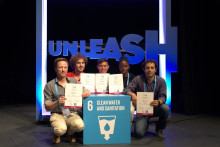University of Twente was represented at the global affair by Diego Quintero, researcher from the CAES group (Computer Architecture for Embedded Systems). Quintero’s team Savvy Sanitation Solutions won the prize for the best idea in the ‘SDG 6 Water and Sanitation’ category and the Award for Global Scalability Potential.
Together with four other team members, the UT scientist came up with an idea to solve problems of sanitation in slums. ‘We focused on Khayelitsha-Cape Town, where you can find one the largest slums in the world. It is estimated that 400,000 people live there and its population keeps growing rapidly. In fact, it is estimated that 900 million people are currently living in slums around the globe,’ explains Quintero.
New toilets needed
‘One of the main issues locals in the slum experience, is the lack of toilets. They currently use temporary portable toilets, such as you can find at festivals. These toilets are located on the main road and get regularly picked up, but they are often too far from many homes and don’t receive proper maintenance,’ continues the PhD candidate. ‘That means people have to walk far in an area that is rather dangerous. If a woman needs to walk to a toilet in the middle of the night, there is a high risk she will get raped or robbed, for instance.’

How to solve this? The shortage of space is one of the main obstacles in slums. ‘Because of the space constraints, we need to rethink the shape of toilets and find new methods to add value to human waste that can also create an economic added value around sanitation,’ Quintero explains the winning idea. ‘We were inspired by beehives. Our idea is to create a central toilet ‘hive’ with other toilets further away, but connected to it with source separation. In the central area, we could collect all the urine and sell it for use in fertilizers. This resource recovery method would pay for the toilets and possibly even guards near the toilets. Although UNLEASH 2018 is officially over, we keep working on the idea and are aiming to create a prototype that could be tested and in the future implemented, first in the slum in South Africa and later in other parts of the world.’
UNLEASH
UNLEASH is closely related to the United Nations’ Sustainable Development Goals announced in 2015. The annually organized event aims to be the ‘world’s main platform for innovative, implementable and scalable solutions to the Sustainable Development Goals (SDGs)’. This year’s edition involved 1,000 talented young people from over 110 countries, all of them carefully selected out of roughly 20,000 applicants.
UNLEASH is supported by many major figures and companies. For example, the closing ceremony on the 6th of June was attended by speakers such as President of Singapore Halimah Yacob, Nobel Peace Prize laureate José Ramos-Horta, the robot Sophia and Oscar-winning actor and UNESCO Special Envoy for Peace and Reconciliation Forest Whitaker.







